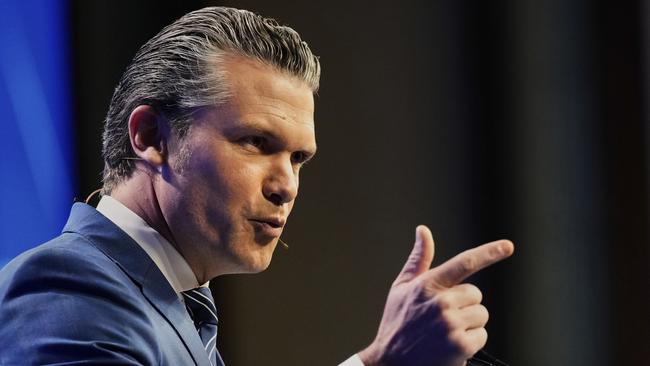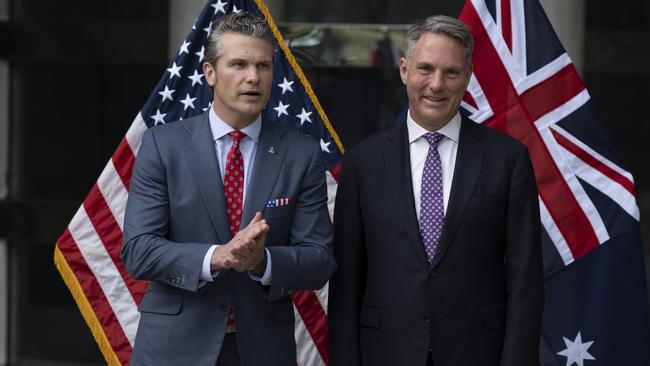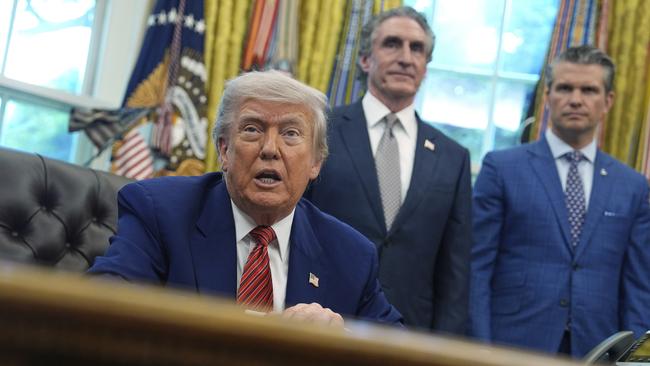Yes, spend more on defence – because we can’t rely on US

There are very good reasons for Australia to increase defence spending to 3 per cent or even 3.5 per cent of GDP across the next decade. The fact US Defence Secretary Pete Hegseth demands it is not one of them.
On the contrary, we will keep getting our defence policy completely wrong if we see defence spending as the price we pay for the US to defend us. We must see it instead as the investment we make in our capacity to defend ourselves independently in the decades ahead when the US will no longer be here for us.
Hegseth’s performance at the annual Shangri-La defence dialogue in Singapore last weekend showed exactly why we can no longer depend on the US and must focus decisively on our own defence.
In his big keynote speech Hegseth boldly proclaimed that the US was determined to contain China’s challenge in Asia. He boasted that the Trump administration was ready, willing and able to go to war with China, and “insisted” US allies in Asia get ready to help.
This is delusional, for three very powerful reasons. The first is Donald Trump doesn’t agree with Hegseth and never has. People say Trump is unpredictable, but on this question he has been completely consistent since long before we went into politics.

He is a true old-fashioned isolationist who does not believe the US has any duty or any need to spend its blood and treasure upholding the global order or defending foreign countries.
Trump does not see allies as assets but as costly and contemptible liabilities. He is relaxed about China’s ambitions to build a sphere of influence in East Asia, just as he is happy to see Vladimir Putin’s Russia extend its influence in Europe.
In fact his administration’s vision of a multipolar world in which a number of great powers each dominate their own backyards is very close to Beijing’s and Moscow’s. That is why his focus is on dominating America’s backyard, threatening Panama, Greenland and Canada.
And that is why – contrary to Hegseth’s bold talk – Trump has always been deeply sceptical about the idea that the US should defend Taiwan or any other Asian allies. And in Trump’s Washington, US policy is whatever Trump says it is. Hegseth was way out of line.
The second reason to ignore what Hegseth said in Singapore is that no one else in Asia is buying it. Our neighbours in Southeast Asia have long ago decided they will not bet their future on America’s staying power in Asia and its willingness to respond effectively to the fundamental transformation of the regional strategic order driven by the rise of China, India and, before long, Indonesia.
And they are right, because the third and strongest reason Hegseth was talking nonsense in Singapore last weekend is that the US no longer has the power it once had to impose its will on China and perpetuate its leadership in Asia.
For 30 years America’s military position in Asia has stagnated as China’s forces, especially its air and naval capabilities, have grown exponentially.
Contrary to Hegseth’s boyish boasts, no one today seriously believes the US can win a war with China over Taiwan. Most likely a bloody stalemate would lead swiftly to a nuclear standoff that China would win because its stake is higher, or to a nuclear war that neither side could survive.

No one in Washington really believes America’s leadership in Asia or its allies there are worth that. Just as no one there is really willing to contemplate nuclear war with Russia to defend Ukraine or even its NATO neighbours. That is why Poland is talking about getting its own nuclear weapons. So is South Korea.
The underlying reality we confront is that in today’s multipolar world the costs and risks to the US of defending its strategic pre-eminence in key regions such as Asia and Europe exceeds the imperative for it to do so.
That is ultimately why the US has failed to respond effectively to China’s challenge in Asia and to Russia’s in Europe. And it is ultimately why Australia cannot depend on the US to keep Asia safe for us in the decades ahead. We live in a post-American world.
Nothing Hegseth says can change this. So it was embarrassing to see our Defence Minister, Richard Marles, praise Hegseth’s speech as “a very clear articulation of American intent, that what they seek is peace through strength”.
And it was unseemly for him to concede any place for Hegseth in Australia’s conversation about our future defence spending, just as it was unseemly of his new opposition counterpart, Angus Taylor, to say we needed to spend 3 per cent of GDP “to ensure we are a good ally”.
What they both need to understand is we cannot buy US protection by meeting some arbitrary American demand on defence spending. The US will defend us or our neighbours only if it thinks it is plainly in America’s vital interest to do so. In World War II and the Cold War, the US thought it was. Today – to judge from what the US does, as well as from what Trump says – it clearly thinks it isn’t.

That is why we need to ignore Hegseth and start thinking for ourselves about how to defend Australia independently. That will mean spending more on defence – quite possibly as much as 3 or 3.5 per cent of GDP.
But what really matters is what we spend it on, and to get that right we need to make some hard decisions.
The place to start is with AUKUS, which commits us to spend immense sums of money on nuclear-powered submarines we do not need and will never receive, all to prove our loyalty to a US alliance that is already, if we only knew it, passing into history.
Hugh White is emeritus professor of strategic studies at the Australian National University. His new Quarterly Essay, Hard New World: Our Post-American Future is out this week.


